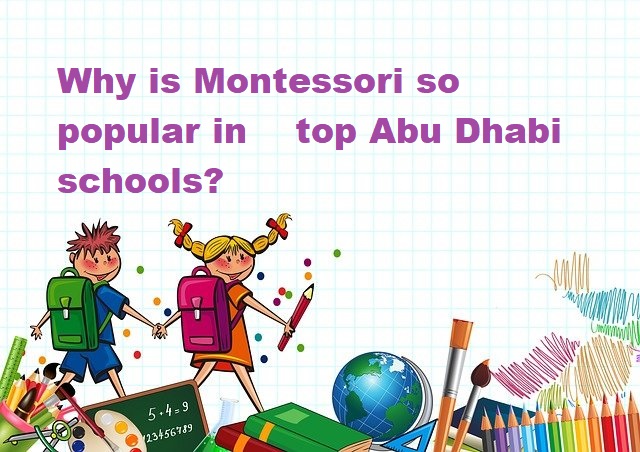Let’s look at the top 5 characteristic traits that the Montessori approach imparts to a child in Abu Dhabi schools.

We have all heard the famous educational term ‘Montessori’. And we are aware that it is a curriculum offered for preschoolers and follows a certain set of methodologies. But it isn’t just limited to the curriculum. In fact, it is a learning process that imbibes. And instills wonderful virtues in a young child that lasts for a lifetime.
Abu Dhabi schools have long understood this advantage. And have proactively chosen the Montessori curriculum to educate their young international students.
Also checkout: The Importance of Early Childhood Education
Reasons Why is Montessori so popular?
Fosters Self-awareness
Most parents do not understand the importance of this character trait in their children. Parents often believe that it is their responsibility to help their kids understand who they are and in this process. They try to instill their own ideas thinking it is the right set of beliefs for their child too.
In the Montessori curriculum, the classroom is designed for kids. Specifically to help initiate self-awareness and a sense of freedom in the environment. Children inside a classroom, use their impulses and their moods to pick and choose their activities. And this enables a sense of individuality inside them. This individuality helps them understand what they like and dislike and also helps them realize their strengths and weaknesses.
A Montessori teacher acts as a guide to help these children overcome their shortcomings. But interfering only when necessary and when the time is right.
Also checkout: Best Free Educational Websites For Kids
Fosters Independence
In a Montessori classroom set up, the activities are arrange according to the height of these kids and to enable easy access. This inculcates independence as children do not wait for the teacher to hand over the activity for the hour. But they initiate this themselves without much help from an outside source.
Apart from activities where they learn different concepts like size, color, shape, sequence, etc… The kids are also taught everyday life skills which are gracefully demonstrated by the Montessori teacher. And practiced by the children many times to attain proficiency.
These good practices eventually make them more independent in all their endeavors, even outside school. And allow them to make their own decisions with little things in their daily activities.
Fosters Discipline and Cleanliness
Though the Montessori classroom is a place for self-exploration and independence, it also has enough emphasis on discipline and cleanliness. Every activity has its dedicated space and children are to replace them in an orderly manner in order to not disturb their other classmates while they are rearranging.
Children are also taught to eat the right way during snack breaks. And also wash their hands appropriately before every meal. Even the hand-washing method is demonstrate by the teacher at the beginning of the class term. And kids are compelled to follow these best practices.
This kind of organized environment positively impacts a child’s behavior and habits. And parents should make sure that these practices are dealt with inside a home environment too. Top Abu Dhabi schools even familiarize the parents with the Montessori method of teaching and learning
Fosters a healthy thirst for learning new concepts
This is one of the best attributes of a Montessori curriculum. As it encourages students to learn new concepts and lessons with vigor and enthusiasm. When a child is left to his abilities, he often learns with interest and curiosity. Children work best when they are under very less pressure and when the lessons are not dictatorial in nature.
This independence in learning builds a thirst for knowledge among these children. And they never hesitate to explore newer concepts and territories of learning on their own. Other skills like self-initiation and problem-solving skills also are enhance during this process. And this can be a great asset when children transition to higher education like primary and secondary grades.
Fosters diversity inside a Montessori classroom
A typical Montessori classroom has three different grades sitting together as one class. This can be advantageous to both younger and older children. Younger children learn to observe the mistakes of their elder peers. And they avoid the same mistakes when they transition to the next level. Older children learn to be more helpful and cooperative towards their young peers. And this brings about acceptance and reasonability in them.
In multi-age classrooms, children also learn leadership skills when they are trying to guide their younger classmates in certain situations. On the other hand, younger children observe these positive traits and learn to imbibe it in themselves as they grow.
In a setup like this, kids do not find it hard when they are transitioning into higher levels of Montessori. As they are already aware of the activities their older siblings were working on. And they have enough confidence to start on their own too.
Was this helpful?
0 / 0